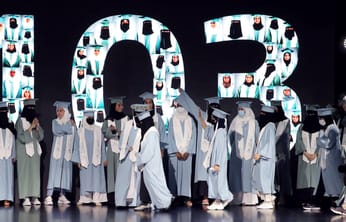
Leading The Charge
With education, mentorship, collaborations, and more, here’s how Saudi Arabia is attempting to close the gender gap in AI

To achieve its technological ambitions, Saudi Arabia is taking bold steps in talent development for tomorrow’s economy
Artificial intelligence (AI) is shaping the future of industries worldwide, and to address these changes, there is a need for skilled workforce to take on the challenge of these developments.
Saudi Arabia is no exception to this need for a skilled talent pool, especially as under the country’s Vision 2030 framework, the Kingdom aims to position itself as a global leader in AI. The changes taking place in the tech world represent both a challenge and an opportunity for Saudi Arabia to fuel its ambitions in this domain.
According to a report produced by Oliver Wyman and the Saudi Data and AI Authority (SDAIA), generative AI (Gen AI) could contribute up to US$20 trillion to global gross domestic product (GDP) by 2030, while saving 300 billion work hours annually. The potential of this technology is already evident, with 55% of surveyed employees across 16 countries reporting using Gen AI tools weekly – in Saudi Arabia, the figure was even higher at 68%.
According to Ali Al-Ismail, Country Manager for Saudi Arabia at AI data cloud platform Snowflake, the enthusiasm for AI tools is clearly evident among Saudi Arabia’s youth and workforce. “We’ve already seen a readiness by many young people in using tools like ChatGPT in their everyday lives, from mundane to more sophisticated tasks,” he said. “This adoption is now extending to the business world, where AI enterprise tools are becoming more widespread and accessible.”
Building A Talent Pipeline
Saudi Arabia has therefore recognized the need to have a workforce that is adept at using AI tools, and the Oliver Wyman report has noted that the Kingdom is actively integrating Gen AI into educational and training programs. This is essentially why entities like SDAIA, King Abdullah University of Science and Technology (KAUST), King Saud University (KSU), and Tuwaiq Academy have been launching specialized programs, research centers, and working on global partnerships – all in the effort to nurture the next generation of AI professionals.
KSU’s Master of Science in AI, for example, covers topics such as machine learning, deep learning, and natural language processing. Additionally, SDAIA has an AIfocused initiative called the Future Intelligence Programmer, which aims to train 5,000 students in collaboration with the Ministry of Education. This program, which will help develop skills in smart car programming, machine learning, and computer vision, is part of a broader effort that has already trained more than 600,000 beginners, 6,000 specialists, and 170 experts.
Education is therefore very much a cornerstone of Saudi Arabia’s AI strategy, and that is why, recognizing the importance of early exposure to technology, the country’s Ministry of Communications and Information Technology (MCIT), in collaboration with the Human Capacity Development Program (HCDP), launched the Digital Future Readiness Program.
Dr. Abdulaziz Albesher, who works with the MCIT as an Executive Advisor for the Deputy Ministry of Future Jobs and Capabilities and as an Advisory Board Member for the Future Technology Ambassadors Program, emphasized the need for a multi-faceted approach to bridging the talent gap, which runs from targeting K-12 students, university-goers, to offering scholarship programs and professional certifications as well. “We are focused on recruitment and initiatives that empower and increase the retention and attraction of talent in technology and information, communications, and technology (ICT) sectors, particularly within the private sector,” he said. “Additionally, we aim to raise awareness in society about different technologies, with a focus on artificial intelligence and data science.”
For K-12 students, the focus is on engaging the stakeholders – from students, instructors and parents – to prepare the next generation for the technologies in the market. “We launched the Digital Future Readiness Program as a pilot in 2024, with an expansion planned this year,” Dr. Albesher said. “In the pilot, more than 500 K-12 students were engaged. It focused on using the tools of generative AI, as well as learning and enhancing skills.” Dr. Albesher noted that the program takes a project-based approach, and more than 90% of the students aged 13-17 years old said it was their first time using AI tools. During the program, students created interactive games and websites, calculators, and more, to showcase their newfound abilities.
In other efforts, the MCIT also introduced an AI curriculum in collaboration with Microsoft, which ran as a pilot at Riyadh School, for Grade 7 students. Covering the fundamentals of AI using the Azure platform, the curriculum also prepares students for global competitions such as Microsoft’s Imagine Cup. Plans are underway to expand this program to schools across the Kingdom.
Also recognizing the pivotal role of educators, Dr. Albesher confirmed that even instructors are enrolled in AI training programs to upskill their teaching methods and learn more about their field of specialization. “It’s not just about the technology itself,” he explained. “I don’t have to be specialized in AI; instead, AI can support me in learning subjects like mathematics, physics, and chemistry too.”
At the university level, Dr. Albesher emphasized that all students – and not just those focused on AI – will need to be trained in the domain. “An AI curriculum should be offered to all university students, regardless of their specialization or fields,” he explained. “For example, it’s also available for business students, law students, and those in various other fields. The idea is that, for example, if you specialize in finance, you can learn how technology, particularly AI, can support and enhance your journey in your chosen field. It’s opening big doors for students to improve their skills using outstanding tools.”
The MCIT has also launched seven micro-credential programs in collaboration with the National E-Learning Center, covering topics such as machine learning, data, science, blockchain and more. In 2025, the number of programs is expected to grow to 15- 20, addressing topics such as fintech and digital health. Not stopping there, the MCIT also supports an initiative in collaboration with the Ministry of Education called the Custodian of The Two Holy Mosques Scholarship Program, specifically through a track called Wa’ed. This track is designed to support the private sector and industry by offering a scholarship opportunity that begins with recruitment. If a company is looking to recruit talent, they can use this program to bridge skill gaps in candidates.
For example, if a technology company seeking specialists in internet of things identifies promising candidates during the interview process, but then notices certain gaps in their expertise, the Wa’ed program allows companies to address this by applying for seats in the scholarship program to upskill these recruits. Dr. Albesher added, “This program is designed to upskill or provide employees with the most essential skills and knowledge to support your company. It requires a commitment from the company to recruit and identify the skill gaps that will help employees survive in the market and remain competitive.”
A Magnet For Talent
It’s clear to see that Saudi Arabia is becoming a regional hub for AI talent, as evidenced by insights revealed by LinkedIn. The data showed that in line with the goals of Vision 2030, the country’s workforce has been increasingly adopting digital skills. On this note, the Kingdom ranks first in the MENA region in several disruptive digital skills such as development tools, materials sciences and nanotechnology. These skills are associated with developing new technologies that are expected to impact the labor market in the coming years.
Upskilling the workforce is something firms like AI data cloud platform Snowflake is committed to. Through its One Million Minds + One Platform program, the company aims to certify over 100,000 users globally, including in Saudi Arabia, on the Snowflake AI Data Cloud by 2027, and to upskill one million people in data and AI by 2029. “The program offers free, live introductory training courses led by Snowflake-certified instructors,” said Snowflake’s Al-Ismail. “These courses provide hands-on experience to empower participants to drive their organizations’ data transformation journeys.” This initiative is especially significant in Saudi Arabia, where, according to a PwC survey, 67% of respondents believe that upskilling will enhance their job performance in the next five years. Additionally, Snowflake’s Northstar initiative focuses on upskilling developers. “Northstar offers a series of online courses and inperson workshops on [online learning platform] Coursera, covering topics such as generative AI, machine learning, and data engineering,” Al-Ismail added.
Such efforts – by companies as well as educational institutions – can be seen to bear fruit in Saudi Arabia, with LinkedIn data also revealing that the country’s talent pool doubled between 2016 and 2023, with AI talent hiring growing 24% year-over-year. And that’s not all – there has also been an increased migration of AI professionals into the country. Insights from LinkedIn has revealed that Saudi Arabia has a positive net flow of AI talent, ranking 15th globally in AI talent attraction relative to population size, up from 24th last year. This is another reflection of how AI skills are being adopted nationwide in Saudi Arabia. LinkedIn’s data highlighted that the fastest-growing AI skills in Saudi Arabia are reinforcement learning, pattern recognition, predictive modelling, supervised learning, and pytorch; all of which support the development of generative AI.
Experts agree that the implementation of AI has evolved significantly, shifting from requiring deep expertise in complex programming and algorithms to becoming more accessible through modern data platforms like Snowflake. According to Al-Ismail, “while strong Structured Query Language (SQL) skills and basic Python knowledge remain important, the emergence of user-friendly interfaces and automated tools within Snowflake has democratized AI development. This allows professionals to focus more on business problemsolving and data strategy, rather than technical implementation details.”
What this essentially means that business analysts and domain experts can now directly contribute to AI projects, as products like Snowflake’s platform, designed for ease of use, simplifies access to AI-powered data and insights. “Analysts and business users can easily create and consume actionable insights with no-code and low-code interfaces,” Al-Ismail said. “Our fully managed service accelerates AI development and reduces technical barriers, so that everyone can benefit from the power of AI.”
While the rise of Gen AI presents exciting opportunities and democratizes the use of AI, it also raises concerns about job displacement and automation. Oliver Wyman’s analysis predicts that approximately 150,000 jobs in Saudi Arabia’s private sector will be impacted by Gen AI by 2030. However, the International Monetary Fund (IMF) forecasted a compound annual growth rate of 5.5% for the Saudi economy, which is expected to create enough new jobs to absorb the risk of job displacement over the next decade.
“We are going to see a generational shift,” Al-Ismail added. “It’s not just young workers, but [also] those who are more experienced in their roles readily using AI to boost productivity, and drive actionable business decisions that deliver value. With the Kingdom’s Vision 2030 initiative to support industries with their digital economic growth, there is a strong appetite for organizations across the region to increase adoption of AI tools and best practices across the workforce. This is further supported by SDAIA, which has been established to support and drive the KSA Data and AI agenda, to become one of the leading economies utilizing and exporting data and AI after 2030.”
Discover the most outstanding articles.اكتشف أبرز المقالات.

Harnessing the power of digital twins to reimagine cities across the KSA and beyond. According to PwC’s 2022 report,

How Riyadh-based The Garage is contributing to a flourishing startup culture in Saudi Arabia In the heart of Riyadh, nestled

Saudi astronauts Rayyanah Barnawi and Ali Alqarni make history in giant leap for the kingdom. From earthbound dreamers to cosmic